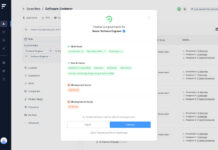
In this guest column, Armen Berjikly, senior director of strategy at Ultimate Software, explains why ethics and a code of conduct is critical to the success or failure of your AI systems.
Artificial intelligence in the workplace is rapidly progressing from fantasy to a pervasive reality that impacts the entire employee journey, from hire to retire.
That makes this an exciting time for our industry, with great opportunities ahead. However, we shouldn’t breathlessly rush to deploy ever more powerful, yet poorly understood, capabilities without first understanding what it is we hope to achieve—as well as the ethical code we’ll follow in getting there.
A transparent code of ethics that all employees can engage with and contribute to is the key to realizing AI's true potential. #HR #HRTech @UltimateHCI @ArmenBerjikly Share on XAs it turns out, this isn’t just an academic or humanitarian exercise. It’s critical to the ultimate success or failure of your AI investment.
At Ultimate Software, our mission has always been to put people first. To do that in the AI era, we’re developing advances in the capability to understand every employee’s voice, including the critical aspects of how we feel, and about what. To navigate the intersection of the human and the machine, we created an internal AI Ethics team, which developed a framework guiding related product and engineering decisions.
For AI in the workplace to reach its potential without unintended negative consequences, the industry at large must put in a similar effort. As HR professionals, our transparent commitment to the ethical use of AI will be a powerful tool for fostering trust within our organizations, thereby driving the success of the very initiatives in which we put so much hope.
Here are some ways HR can embrace a strong, clear ethical foundation for the use of AI.
Begin with a Code of Conduct
To begin building your own AI code of conduct, work backward from a vision of what you want to accomplish and what behaviors your culture requires a solution to follow. For example, most organizations are drowning in data. Adding more data, no matter how clever, isn’t an aspiration. So “Achieve actionable insights, not numbers” could be a good requirement.
Our belief in always putting people first informs our Code of Conduct at Ultimate. For example, we believe AI initiatives must ensure all voices–not just management or extroverts, for example–are heard, and that anything we build must be in the service of helping each person realize his or her potential. Above all, we believe AI must be designed to assist—not replace—people. To us, AI is about augmentation, not automation.
Emphasize Privacy Above All
For any AI initiative to succeed, employees must trust that their privacy is valued and protected. You achieve this in two ways: first, by ensuring that employees know exactly what data is being fed into the system. Companies should never secretly analyze private conversations or e-mails, for instance. Second, employees should know that their feedback is fully protected from being used against them, which can be achieved by appropriate anonymization and aggregation.
While there are myriad operational steps to take to make sure this is a foundational, highly valued aspect of your ethical code is critical for executives and employees alike. Trust will only increase the quality and value of the feedback and insights provided. By creating an environment where employee privacy is respected, and individuals feel comfortable sharing their thoughts, you’ll set the stage to achieve meaningful change within your company. Without it, this is an exercise in futility.
Expand Your Focus to Teams, Not Just Individuals
Employees commonly fear that AI will be used to single them out or enforce conformity. A great way to both address this concern and focus on results is to purpose your technology initiatives to add understanding at the team level.
Frankly, AI is often more valuable when put to work on larger trends affecting an organization, trends that go beyond any one individual. For example, a sales team may be frustrated with its counterparts in Marketing because of a lack of competitive intelligence. Or company expansion may be making employees feel excited and energized but unsure about their future. Both insights have huge consequences when addressed, and they’ll far outweigh the consequences if you only addressed the concerns of one individual.
Make Sure All Voices Are Heard
Employees want to be heard—that’s why they provide feedback in the first place. AI and natural language processing, or NLP, allow employers to hear their collective voice in a way that hadn’t been possible before now.
NLP software can read and analyze employee input even on open-ended survey questions, and categorize it by theme and emotion. By efficiently understanding the themes and sentiments across their workforce, employers get a better picture of their organization’s overall health, as well as the pain points of specific teams.
Emerging technologies like AI and machine learning eliminate some of the common obstacles (or excuses) that prevent HR departments from gathering input from all employees. While any one employee can create nearly infinite value, we often have settled for sampling from or outright ignoring large populations, such as foreign offices speaking another language. NLP solutions allow employees around the world to complete surveys in their native language. Their input will be heard and valued, just like their domestic counterparts.
Help Everyone Realize His or Her Potential
Although studies show that AI will create more jobs than it disrupts, conversations about the future of work still revolve around whether or not jobs will be taken away from humans. It’s certainly true that AI can, for example, analyze text more quickly and with much higher accuracy than humans can. But analyzing text is almost never the end goal—it’s figuring out what to do with what you learn. To put this another way, let the machine do things we’re either not good at or shouldn’t be doing in the first place, and let its work inform our very human decision-making.
We have a strict covenant in Ultimate’s code of conduct that our AI is not intended to act on its own. It shouldn’t replace HR with a joystick. Instead, its purpose instead is to partner with employees who continuously have critical decisions to make on their own, and help each decision be faster, fairer, backed by evidence and made with more ease and confidence. We aspire to use AI to help employees relegate notoriously unreliable and uncomfortable “gut feeling” decisions to the past.
Building software in the era of AI provides exciting opportunities, but it’s fraught with challenges. Working backward from the end goals and developing a transparent code of ethics that all employees can engage with and contribute to is the key to realizing the true potential of this technology.
AI can help each employee realize his or her potential and build fundamentally stronger organizations in the most sustainable and rewarding fashion. Ultimately, AI is meant to help us understand people better, so we can help them be the best version of themselves at work.
Armen Berjikly is senior director of strategy at Ultimate Software, a leading cloud provider of HCM solutions. Based in Weston, Fla., Ultimate Software is a sponsor of the HCM Technology Report. To learn more, click here. This article was originally published in HR Daily Advisor.
Sign up for our newsletter here.
Image: iStock















